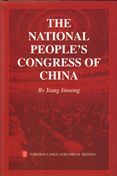The National People's Congress of China
Publisher:
Foreign Languages Press
Publication:
1/2003
Languages:
English
Binding:
Hardcover
ISBN/SKU:
9787119031330
Pages:
560
Sizes:
240 x 160mm
Weight:
0.8480
In Stock (Only 3 copies left)
To be dispatched within 1 business day
To be dispatched within 1 business day
Special Price
£31.86
£31.86
Regular Price
£33.95
(€35.68)
The National People's Congress of China is approaching its 50th anniversary since its birth in 1954. As China's highest organ of state power the NPC's circumstances and fate visually embodies the swing of the pendulum of the democratic life of the Chinese people. The book is the first English book on the NPC model written by a Chinese political scholar. Part One briefly reviews the history of the Chinese political system from the Xia dynasty through the formation of the Republic of China, pointing out cultural patterns that have affected the NPC system. Part Two explains the NPC system as set down in the 1954 Constitution and argues that the destruction inflicted upon the NPC during the 'cultural revolution' period amounted to a disaster for both the Communist Party of China and the Chinese people. Part Three displays 'in thick and heavy colours' the reforms made to the NPC system under the 1982 Constitution. It shows a comprehensive picture of the refurbished NPC system with its elections, its powers and functions within the national power structure, its internal organization, its legislative procedure, its decision powers and processes, its discretion over the personnel of the other constitutional branches, its oversight powers and activities, its special committees, its relations with political parties, its Deputies and Members, its relations with the public and the media, its space, time, funding and staff, its relations with local people's congresses and its relations with foreign legislatures. The purpose is to accurately depict the actual operation of the NPC system with fresh materials. Part Four generalises major features of the NPC system model, justifies the model from historical, international and domestic perspectives, discusses its strengths and offers criticisms on its shortcomings.




